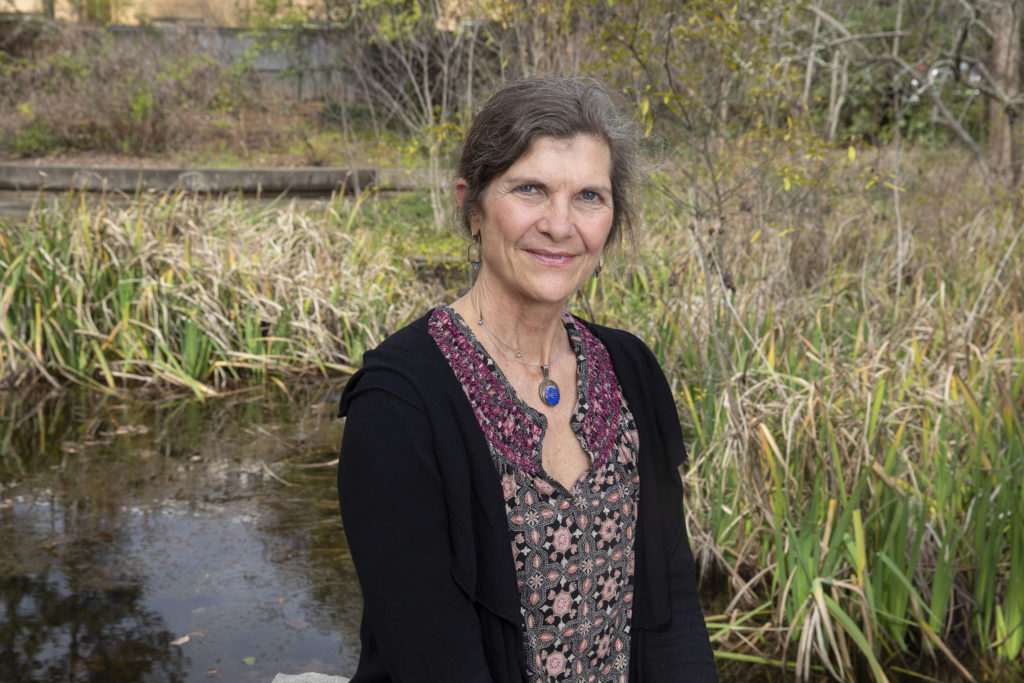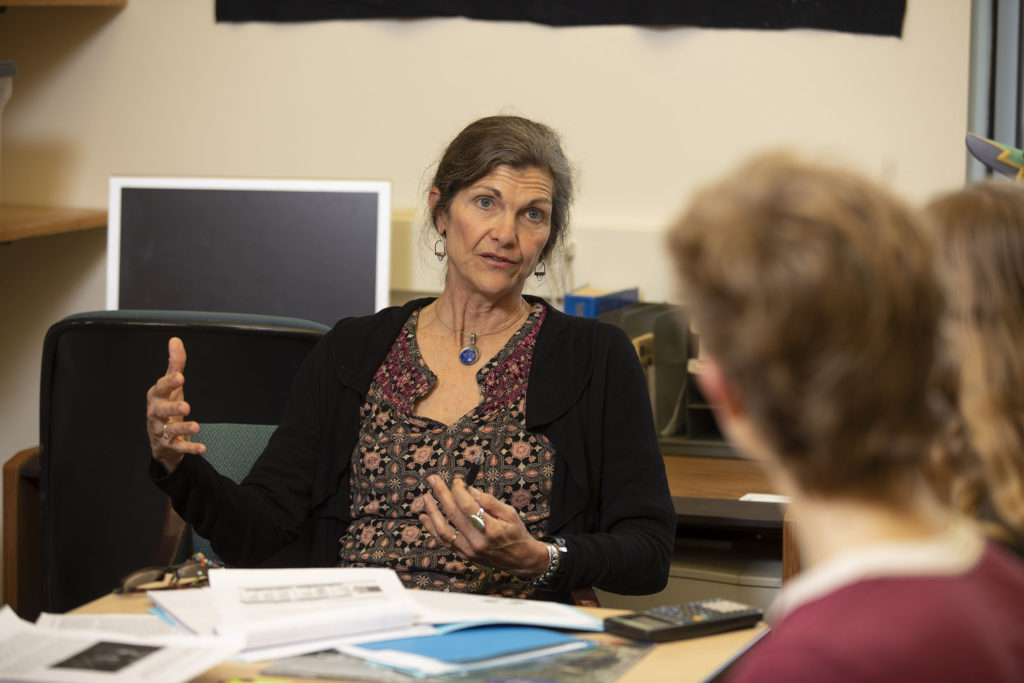Amy Rosemond, a professor in the Odum School of Ecology, conducts research that advances our fundamental understanding of freshwater ecosystems while also identifying specific ways to improve stream health.
When did you come to UGA and what brought you here?
I arrived in Athens in 1994 as a freshly minted doctoral student with my partner and two very young kids—2 years and 4 weeks old! I had been awarded a National Science Foundation postdoctoral fellowship to work with aquatic ecosystem ecologists Cathy Pringle and Judy Meyer in ecology. The fun was just beginning, because the project involved field work in Costa Rica. In preparing for what at that time was a relatively less-known and remote location, I planned and brought everything from diapers to scintillation vials—and sustained a (thankfully “dry”) snake bite! The added value of work in the tropics and meeting so many new people was worth it! The approach to ecology at UGA was “wide open” and encompassed spatial, temporal and geographic scales. The holistic approach to understanding ecosystems and the amazing ecology faculty attracted me to UGA; I saw what was here and said, “I want to be a part of that!”
What are your favorite courses and why?
“Freshwater Ecosystems!”—because the health of freshwater ecosystems is so critical to human well-being, and we need talented UGA students to understand the challenges we face and their solutions. This course is not only eye-opening regarding the threats to freshwater systems, but it gives students the knowledge of what systems require to function and provide ecosystem services to humans. Services include high-quality drinking water, the ability to play in rivers and streams unharmed, and the chance to catch lots of fish! I feel a great responsibility to empower students with the knowledge of the current state of freshwater ecosystems—nearly half of U.S. streams are in poor condition, sadly—and we are experiencing algal blooms in many lakes and coastal areas. But, along with that, students learn what can improve these conditions. I am proud of what the students have accomplished by the end of the semester and look forward to seeing how they apply what they learn in their careers and lives.
How do you describe the scope and impact of your research or scholarship to people outside of your field?
Our lab is focused on understanding what makes streams and rivers “tick,” identifying how they are impacted by global change and the aspects of systems that are important to manage and restore. We are measuring the effects of stressors like nutrient pollution, increasing stream temperature, changes in the amount of river flow and how these factors affect the underlying biology of streams. Everything needs to eat, so we start at the bottom of the food web. All streams and rivers have two main food resources: algae, and the leaves and wood that come from trees. In a stream, small aquatic insects eat algae and dead leaves, and they are eaten by fish and salamanders. Our studies have determined how nutrients, temperature and river flow affect these food resources and the consumers that eat them. What we’ve learned has advanced our basic ecological understanding of how streams work and has identified specific ways to improve stream health.
How does your research or scholarship inspire your teaching, and vice versa?
Research fires up my motivation and passion to share what I am learning with students. In research, you are not only learning new information about freshwater systems and the way they function, but also ways of understanding them and the new methods and tools that can be used. Research is not just what my lab and our collaborators are doing, it’s the whole field, including people working around the globe. Together, a “toolbox” of insights and approaches becomes available to us all. I want to pass that whole toolbox on to students and hope they use things from it that they had never conceived of before. Teaching feeds back to research from the perspective of focusing on “the things that matter.” When you have limited time in a semester, let alone a lecture period, you are reminded to hit the topics and mechanisms that are the most important. That helps to focus research questions on priority areas that most significantly advance our understanding of freshwater ecosystems.
What do you hope students gain from their classroom experience with you?
I hope they become even more passionate about understanding and caring about the natural resources—food, land, air and water—that we all depend on. I want students to see that all of our natural resource use is a function of systems that are in place—and that we can’t look at water use without seeing the connections to the energy generation we depend on or the agricultural systems that produce our food. I want students to understand that we have the capacity to sustain healthy, functioning freshwater ecosystems, but it requires doing things differently than we are currently. Future generations depend on the decisions we are making now. Our current practices threaten our access to clean water, the vitality of stream life and our ability to sustain life-giving freshwater resources for future generations. I want students to become armed with tools to help society in making decisions for long-term freshwater sustainability and motivated to help bring about change.
The one UGA experience I will always remember will be …
In August 2017, areas near Athens were going to experience a total solar eclipse! This can be a once in a lifetime event because they occur so infrequently. Luckily, totality coincided with our freshwater ecosystems lab time on a Monday afternoon. We rented a bunch of kayaks from UGA Recreational Sports and headed up to Lake Hartwell, where we were awed by this cool celestial event! Some people were in the water, others on the shore, as the sky got gradually darker. The sun was totally eclipsed for two solid minutes when it got eerily quiet. We even took a dissolved oxygen probe to see if photosynthesis by phytoplankton in the lake shut down when it got dark—and it did! We ate some snacks and shared impressions of the event before heading back to Athens. I think it is something we will all remember for a long time. It reminds me how lucky I am to work with young people and experience the joys of living and learning together!

